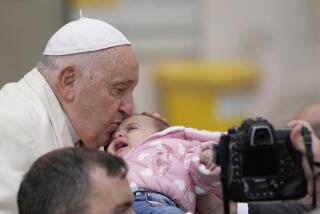Israel, Vatican Begin Talks on Diplomatic Ties
JERUSALEM — Israel and the Roman Catholic Church opened talks in the Vatican on Wednesday on creating formal diplomatic ties, a move that would bridge a longstanding gap between the Jewish state and the world’s largest Christian community.
Israel’s ambassador to Italy, Avi Pazner, and Yosef Hadass, the director general of Israel’s Foreign Ministry, met with Cardinal Claudio Maria Celli, the Vatican undersecretary for state relations. Shortly afterward, the Vatican announced the establishment of a permanent commission to discuss formal relations. The commission will meet in November.
“This is the first clear step of an official nature that can be looked upon with optimism,” Vatican spokesman Joaquin Navarro said.
In Jerusalem, Foreign Minister Shimon Peres declared that “great importance should be attached to this.”
Israeli officials attributed the step to the Vatican’s eagerness to have a hand in Mideast peace talks at some stage--especially when the issue of Jerusalem, a city holy to Christians as well as Jews and Muslims, is raised.
The Catholic Church has been reluctant to recognize Israel’s sovereignty over Jerusalem for fear that non-Jewish faiths would be excluded from the life of the city. Pope John Paul II speaks frequently of his wish that Jerusalem become a home in which, as he once put it, “Christians, Jews and Muslims . . . all feel themselves brothers.”
Equality of the three monotheistic religions in Jerusalem, and for all its residents, has been a consistent demand of the Vatican since Israel formally annexed Arab East Jerusalem to its capital in 1980.
In 1984, the Pope laid out two bases for future Vatican recognition: that a special status be established “with international guarantees that cannot be placed in jeopardy by any party in the future” and that Israel be provided a secure frontier and the Palestinians a homeland.
Palestinian observers responded to Wednesday’s announcement with resignation. “It’s only natural in the current atmosphere,” political analyst Mahdi Abdul-Hadi said.
Navarro, the Vatican spokesman, said there is no reason for Palestinians to be upset with the move. The Vatican has hosted Yasser Arafat, head of the Palestine Liberation Organization, on several occasions.
“Palestinians affiliated with the PLO are meeting with Israelis in the peace talks,” Navarro pointed out. “Why shouldn’t we?”
Israel has declared Jerusalem its “indivisible and eternal capital,” and the new government of Prime Minister Yitzhak Rabin has reaffirmed the stand. The city’s eastern sector--where the Palestinians want to establish their capital--fell under Israeli control during the 1967 Middle East War. The United States regards the status of Jerusalem as still subject to negotiation.
Israel has long pressed the Vatican for ties as a means to promote understanding between Judaism and Christianity. In 1986, Israeli President Chaim Herzog, remarking on a visit by John Paul II to Rome’s main synagogue, referred to the need to redress “the injustice which the church perpetrated on the Jewish people during 1,500 years of history.”
In 1985, current Foreign Minister Peres, who was then prime minister, visited the Vatican. During his meeting with John Paul, Peres distinguished between religious and political aspects of Jerusalem’s status.
“Religiously and spiritually, I believe relations are OK. There are no complaints,” Peres said at the time. Implying the existence of other problems, he added, “Politically, Jerusalem remains our united capital.”
The Pope has never visited Jerusalem. One of his predecessors, Paul VI, traveled to the city on a pilgrimage but was careful not to designate the trip a state visit.
Oblique connections between the Israeli government and the Vatican have resulted in awkward incidents. During a 1987 visit to Jerusalem, New York Cardinal John J. O’Connor was forbidden by the Vatican to visit Israeli officials in their offices, with the exception of the minister of religious affairs. He met Herzog, the country’s ceremonial leader, at the president’s official residence but wore only a black clerical robe rather than his customary red-trimmed cardinal’s dress.
The establishment of a permanent committee was welcomed in Israel, although some comments were laced with exasperation over the church’s tardiness. “It’s high time,” said David Rosen of the Anti-Defamation League. “It’s nice to see the Vatican coming to its senses.”
Israeli officials were reluctant to attribute the diplomatic progress to the advent of the dovish Rabin government. Quiet talks with the Vatican have been going on for some time, they pointed out. However, one senior official suggested that perhaps the Vatican wanted to give a “welcome present” to Rabin, who took power just over two weeks ago.
More to Read
Sign up for Essential California
The most important California stories and recommendations in your inbox every morning.
You may occasionally receive promotional content from the Los Angeles Times.










